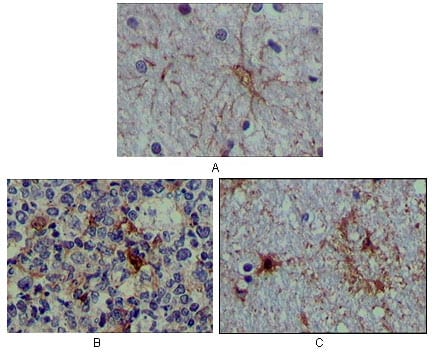
| WB | 咨询技术 | Human,Mouse,Rat |
| IF | 咨询技术 | Human,Mouse,Rat |
| IHC | 1/200 - 1/1000 | Human,Mouse,Rat |
| ICC | 技术咨询 | Human,Mouse,Rat |
| FCM | 咨询技术 | Human,Mouse,Rat |
| Elisa | 1/10000 | Human,Mouse,Rat |
| Aliases | S100; S100A; S100-alpha; S100A1 |
| Entrez GeneID | 6271 |
| clone | 2C8B8 |
| Host/Isotype | Mouse IgG1 |
| Antibody Type | Primary antibody |
| Storage | Store at 4°C short term. Aliquot and store at -20°C long term. Avoid freeze/thaw cycles. |
| Species Reactivity | Human |
| Immunogen | Purified recombinant fragment of S100A1 expressed in E. Coli. |
| Formulation | Purified antibody in PBS with 0.05% sodium azide. |
+ +
以下是关于S100A1抗体的3篇参考文献,按文献名称、作者和摘要内容概括列举:
---
1. **文献名称**:*"S100A1: A regulator of striated muscle sarcoplasmic reticulum Ca²⁺ handling, sarcomeric, and mitochondrial function"*
**作者**:Remaillard A, et al.
**摘要**:该研究利用S100A1特异性抗体,通过免疫共沉淀和Western blot技术,揭示了S100A1蛋白在心肌细胞中对肌浆网钙离子循环的调控作用,及其在心力衰竭中的潜在治疗靶点价值。
---
2. **文献名称**:*"Targeted deletion of S100A1 attenuates gliomagenesis and improves survival in mouse models"*
**作者**:Leclerc E, et al.
**摘要**:通过免疫组织化学结合S100A1抗体,研究发现S100A1在胶质瘤中高表达,并通过调控MAPK/ERK通路促进肿瘤生长。抗体阻断实验表明抑制S100A1可显著延缓肿瘤进展。
---
3. **文献名称**:*"S100A1 antibody-based modulation of β-adrenergic signaling in cardiomyocytes"*
**作者**:Boerries M, et al.
**摘要**:研究利用S100A1抗体探究其在心肌细胞β-肾上腺素信号通路中的作用,发现S100A1与β2-肾上腺素受体相互作用,抗体干预可增强心肌收缩力,为治疗心功能不全提供新策略。
---
如需具体文献来源(期刊、年份等),可进一步补充关键词检索。
S100A1 is a calcium-binding protein belonging to the S100 family, which plays critical roles in regulating cellular processes such as cell cycle progression, differentiation, and intracellular calcium signaling. Primarily expressed in cardiac and skeletal muscle, as well as in the brain, S100A1 functions as a homodimer or heterodimer with other S100 isoforms (e.g., S100B). It interacts with target proteins like the ryanodine receptor (RyR) and sarcoplasmic reticulum Ca²⁺-ATPase (SERCA), modulating calcium homeostasis and contractility in muscle cells. Dysregulation of S100A1 is implicated in cardiovascular diseases (e.g., heart failure, hypertrophy), neurodegenerative disorders, and certain cancers.
S100A1 antibodies are essential tools for detecting and studying this protein’s expression, localization, and function. These antibodies are commonly used in techniques like Western blotting, immunohistochemistry (IHC), and immunofluorescence (IF) to assess S100A1 levels in tissues or cultured cells. Monoclonal and polyclonal variants are available, with specificity validated against recombinant or native S100A1. Researchers utilize these antibodies to explore S100A1’s role in disease mechanisms, particularly its cardioprotective effects and potential as a therapeutic target. Cross-reactivity with other S100 proteins (e.g., S100B) is a key consideration, necessitating rigorous validation to ensure assay accuracy. Commercial S100A1 antibodies are widely used in both basic research and clinical studies to advance understanding of its pathophysiological relevance.
×